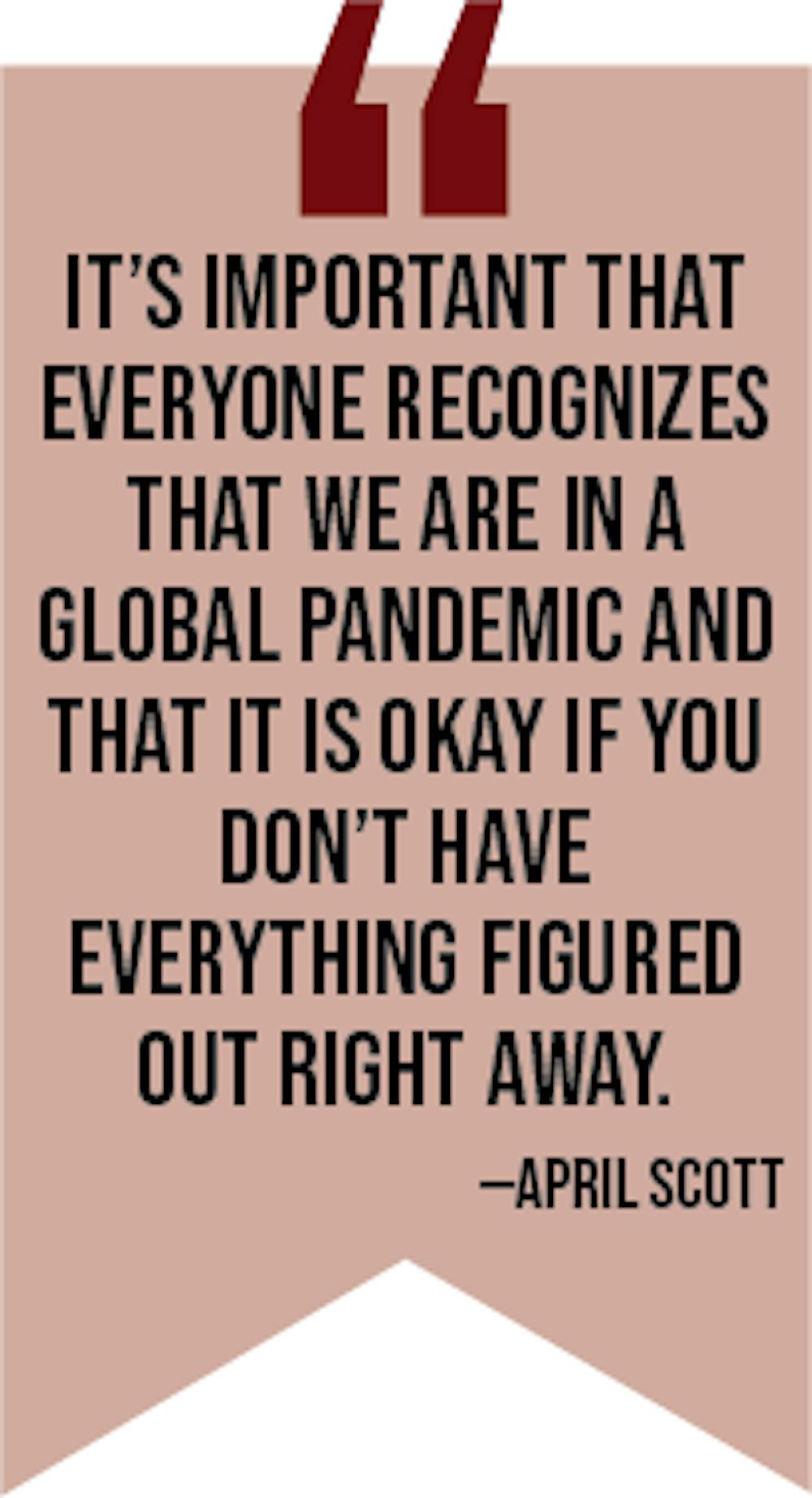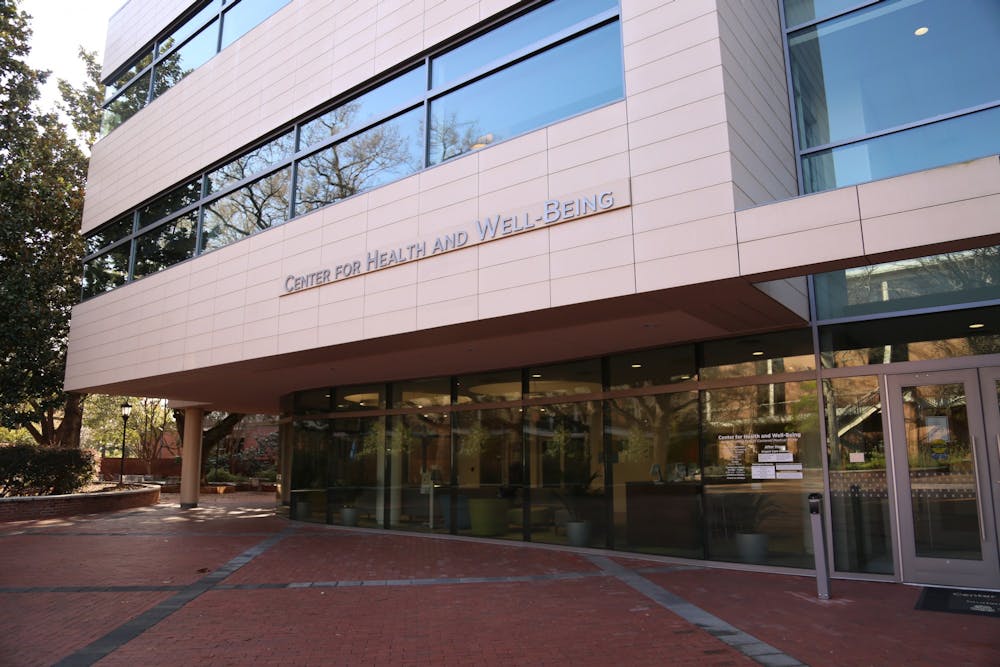With the transition to online classes and social distancing, students, faculty and staff are adjusting to new normals, including maintaining their mental health.
“Some ways that students and faculty can take care of their mental health is, one, give themselves permission to struggle,” April Scott, Student Health Services' associate director of mental health initiatives, said.
Warrenetta Mann, a psychologist and the director of counseling and psychiatric services at USC, said taking breaks is important because people are spending more time in front of a computer screen.
“Taking a break, getting outside while the weather is nice, even if it's just to sit outside by yourself because we still have to respect, you know, social distancing, but spending time with family and friends; not letting your work kind of take over,” Mann said.
Because the pandemic feels temporary, it can be tempting to completely change how you are eating and exercising.
“The reality is, we don't know how long this will be,” Mann said. “So we really have to think longterm, like, how do I build in the things that are going to keep me healthy?”
Student Health Services is offering free teletherapy for in-state students who have already been in therapy for the spring semester.
“We wanted to make sure that we prioritize getting back with those students and not just kind of dropping them off in the middle of things,” Mann said.
Mann said Student Health Services is also working on a plan to open up teletherapy to all students who are interested.
Student Health Services is using a program called Therapist Assistant Online, or TAO. This program has different options for “therapeutic interventions,” such as a Therapy Assistance Option and Self-Enroll Self-Help.
The Therapy Assistance Online option allows patients to do therapy modules and meet with a counselor through HIPAA-compliant video conferencing. Self-Enroll Self-Help is a self-directed option that gives users access to tools and modules without talking to a mental health professional.
Because of licensing laws, the Counseling and Psychiatry Department can only serve in-state students. Therapists that are licensed in South Carolina are not allowed to practice in other states. Serving students who are currently located in other states would qualify as practicing outside of South Carolina.
For out-of-state students, Mann suggested seeking out teletherapy platforms such as BetterHelp and TalkSpace. The cost of counseling for these programs ranges from $40 to $70 per week.
“There are a lot of companies out there really trying to help people right now because they know people need those resources,” Mann said.
For students, faculty and staff with pre-existing health conditions, Mann said to reach out to previous providers to let them know if there have been any changes in symptoms.
“I mean, even the healthiest people right now are feeling anxious, are feeling a little depressed and bored and, you know, kind of isolated, and so, people with pre-existing conditions really need to reach out and make sure that they're taking care of their mental health and not letting things get worse,” Mann said.
Student Health Services also created digital programming initiatives on social media, including meditation, crafting and cooking classes as self-care options.
Scott said increasing self-care and limiting the amount of news intake are also ways to help maintain your mental health.
“Consume the news wisely. Maybe you don't need to watch, you know, the news every single day, all day,” Scott said. “But just a little bit, here and there, to get the information you need.”
Danielle Johnson, a fourth-year public health student, said she has been taking a break from news and social media.
“I really feel like it has helped with my anxiety level, and I guess just, in general, to not be so focused on my screen at all times,” Johnson said.
Frances Harrison, a fourth-year public relations student and student-athlete, said it is important to have a balance on social media.
“People struggle with being on it too much and kind of comparing themselves,” Harrison said. “I think, also, a lot of people are taking advantage of it and expressing themselves in a way that maybe they weren't before because they have this free time.”
Both Johnson and Harrison are hosts on the podcast Hear Me Out, which focuses on stories of resiliency and mental health.
“We just talk about how [guests] get through them, what helps them, their support systems and, kind of, how they show that resiliency through getting through a hard time,” Harrison said. “It's mainly just to help listeners relate to, maybe the story or to get a sense that they're not alone.”
Johnson said one of the ways she has been coping was scheduling time to stay connected with her friends.
“One of my favorite things that we've been doing is, we've scheduled for every Wednesday night, we're having a FaceTime dinner,” Johnson said.
As a senior student-athlete, Harrison has been adjusting to a new routine and the announcement of getting another year of eligibility to play beach volleyball. The NCAA announced on March 30 that spring sport student-athletes will get an additional season of eligibility.

“My season kind of came to a stop pretty quick. I wasn't able to finish out my senior season,” Harrison said. “I didn't get my senior night, all that. So, it was pretty tough for me at first, just accepting that and trying to move forward with that. So, when I came home, it was, you know, what am I gonna do now?”
When it comes to adjusting to the pandemic, Scott said that one of the biggest things you can do is know that it is okay if you can’t get everything done.
“It's important that everyone recognizes that we are in a global pandemic, and that it is OK if you don't have everything figured out right away,” Scott said.
Resources
USC Student Health Services
https://sc.edu/about/offices_and_divisions/student_health_services/index.php
Center for Disease Control: Stress and Coping
https://www.cdc.gov/coronavirus/2019-ncov/daily-life-coping/managing-stress-anxiety.html
National Alliance on Mental Illness
https://www.nami.org/help

